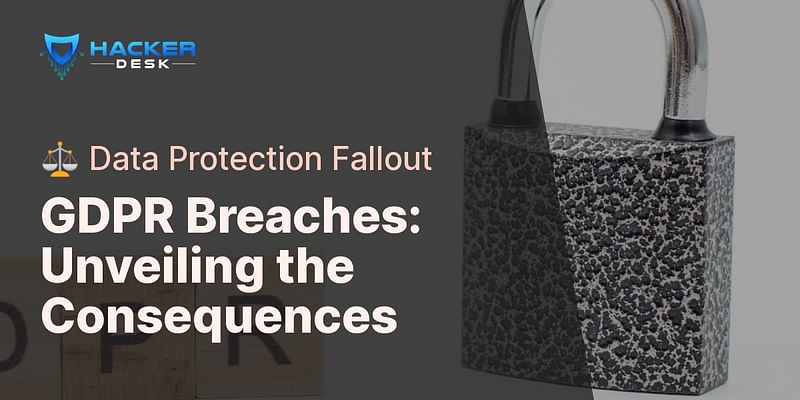Dean Reilly is a seasoned professional in penetration testing and ethical hacking. His unique methodology in uncovering security vulnerabilities has led to numerous organizations bolstering their cybersecurity measures. Dean strongly advocates for the dissemination of knowledge and frequently shares his insights on ethical hacking.
Hey there!
Breaching the General Data Protection Regulation (GDPR) can have serious consequences for organizations. The GDPR is a comprehensive data protection law that aims to safeguard the personal data of individuals within the European Union (EU). As a cybersecurity enthusiast, I understand the importance of complying with this regulation to protect both your organization and your customers.
Financial Penalties: One of the most significant consequences of breaching the GDPR is the potential for hefty financial penalties. The regulation empowers supervisory authorities to impose fines of up to €20 million or 4% of the global annual turnover, whichever is higher. These penalties can be a massive blow to any organization's bottom line.
GDPR Financial Penalties Breakdown
| Penalty Type | Minimum Fine | Maximum Fine | Impact on Business |
|---|---|---|---|
| Lower Level Infraction | €10 million | 2% of global annual turnover | Significant financial loss, potential damage to reputation |
| Upper Level Infraction | €20 million | 4% of global annual turnover | Severe financial loss, major damage to reputation and potential business closure |
Reputational Damage: A GDPR breach can also result in severe reputational damage. When customers learn that their personal data has been compromised, they may lose trust in your organization. This loss of trust can lead to a decline in customer loyalty, negative publicity, and a damaged brand image. Rebuilding trust can be a long and challenging process.
Legal Consequences: Breaching the GDPR can also expose organizations to legal consequences. Individuals affected by a data breach have the right to seek compensation for any material or non-material damage suffered. This can result in costly legal battles and potential lawsuits.
Investigations and Audits: In the event of a GDPR breach, supervisory authorities have the power to launch investigations and audits into your organization's data protection practices. These investigations can be time-consuming, intrusive, and may require you to provide detailed documentation and evidence of your compliance efforts.
Loss of Business Opportunities: Non-compliance with the GDPR can also lead to a loss of business opportunities. Many organizations, especially those outside the EU, prefer to work with GDPR-compliant partners to ensure the protection of personal data. By failing to meet the GDPR requirements, you may miss out on potential partnerships and contracts.
Operational Disruptions: Dealing with the aftermath of a GDPR breach can cause significant operational disruptions. You may need to allocate resources to investigate the breach, notify affected individuals, implement remedial measures, and enhance your data protection practices. These disruptions can impact your day-to-day operations and divert resources from other critical tasks.
To avoid these consequences, it's crucial to prioritize data protection and implement robust cybersecurity measures. Regularly conducting penetration testing can help identify vulnerabilities in your systems and networks, allowing you to address them proactively and ensure GDPR compliance.
Benefits of Penetration Testing for GDPR Compliance
Remember, cybersecurity and data privacy go hand in hand. By prioritizing both, you can protect your organization's reputation, avoid financial penalties, and maintain the trust of your customers.
Stay secure and compliant!
Max Stealth












